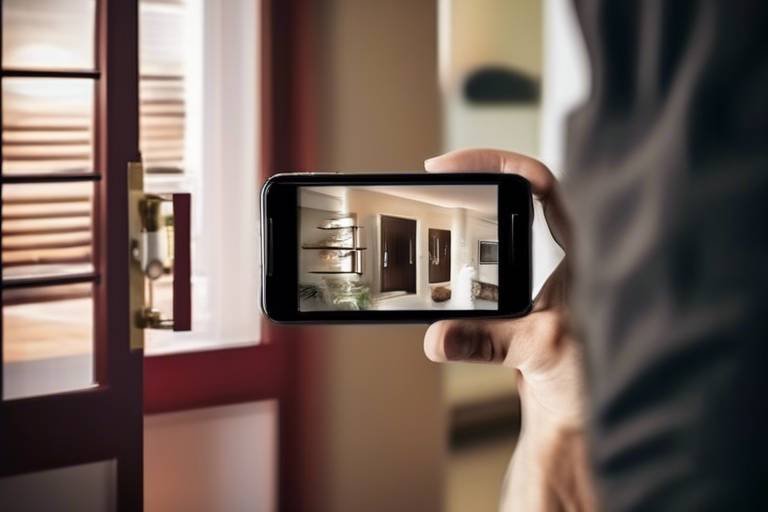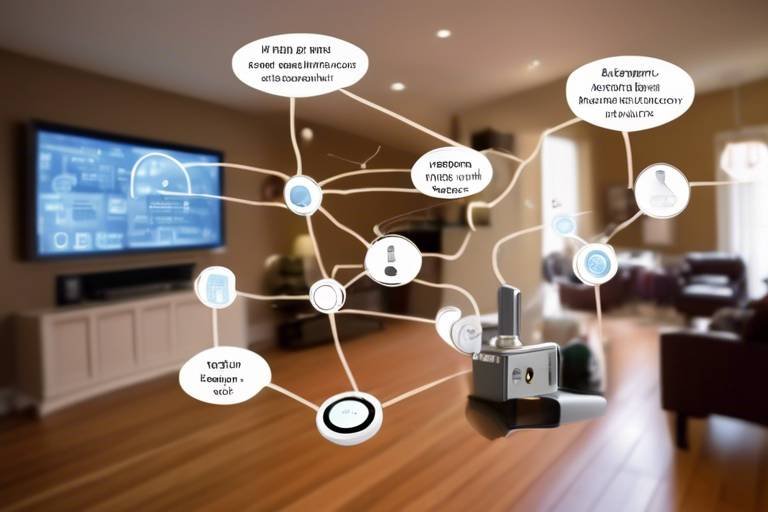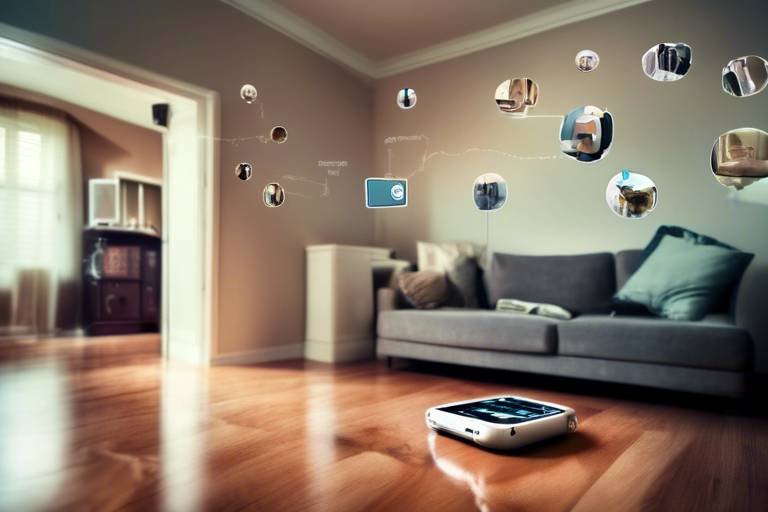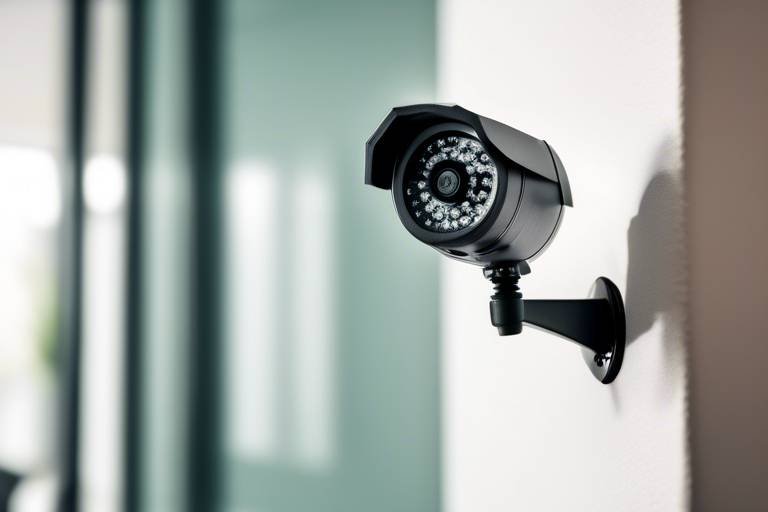How Effective are Home Security Systems
In today's world, where safety concerns are on the rise, the question of how effective home security systems truly are becomes paramount. Homeowners are increasingly looking for ways to protect their properties, families, and peace of mind. With crime rates fluctuating and new threats emerging, investing in a home security system might not just be a luxury—it's becoming a necessity. But how do these systems actually stack up in terms of effectiveness? Let's dive into the various aspects that contribute to their reliability and the peace of mind they can offer.
Understanding the significance of home security systems is crucial for homeowners. With crime rates steadily increasing in many urban areas, the need for effective measures to protect property and loved ones has become more pressing than ever. Think about it: your home is not just a structure; it's a sanctuary filled with cherished memories and valuable possessions. The thought of a break-in can be unsettling, and that’s where home security systems come into play. They serve as a deterrent against potential intruders and provide a sense of safety that can significantly enhance your quality of life.
When it comes to home security, one size does not fit all. Home security systems come in various forms, including wired, wireless, and smart systems. Each type has its unique features, catering to different homeowner needs and preferences. Understanding these options is essential for making an informed choice. For instance, wired systems are often praised for their reliability, while wireless systems offer flexibility and ease of installation. Smart home security solutions are gaining traction, integrating advanced technology to provide comprehensive security. Let’s explore these options in greater detail.
Wired security systems are often seen as the traditional choice. They offer reliable connections and are less susceptible to interference, which can be a significant advantage in ensuring continuous monitoring. However, installation can be more cumbersome, often requiring professional help to set up the necessary wiring throughout the home. If you're considering this option, it's essential to weigh the advantages against the potential installation challenges. Homeowners should also think about the long-term reliability of wired systems, as they tend to have lower maintenance needs compared to their wireless counterparts.
On the flip side, wireless security systems provide flexibility and ease of installation, making them a popular choice among modern homeowners. These systems can be set up quickly without the need for extensive wiring, which is particularly beneficial for renters or those looking to avoid invasive installation processes. However, wireless systems can sometimes be vulnerable to interference from other devices, which is a critical factor to consider. Despite this, advancements in technology have led to more robust wireless options that can effectively cater to the security needs of today’s homeowners.
Smart home security solutions are revolutionizing the way we think about home safety. These systems integrate various devices like cameras, alarms, and smart locks, working together to provide comprehensive security for homes. Imagine being able to monitor your property from your smartphone while you’re at work or on vacation. Smart systems not only offer real-time alerts and video feeds but also allow homeowners to control their security settings remotely. This level of convenience and control is a game-changer, making it easier than ever to ensure your home is secure.
Several factors determine the effectiveness of home security systems, including system quality, installation, and user engagement. The quality of the equipment you choose plays a crucial role in how well your system performs. Opting for reliable products can make a significant difference in the long run. Additionally, proper installation and regular maintenance are critical for optimal performance. It's not enough to simply install a system; you must also ensure it is kept in good working order. All these factors combined can dramatically impact the overall security performance of your home.
The quality of security equipment directly influences its effectiveness. Investing in high-quality products can ensure maximum protection and durability over time. While it might be tempting to go for budget options, remember that you often get what you pay for. Reliable equipment not only enhances security but also provides peace of mind that your system will function as intended when you need it most.
Proper installation and regular maintenance are critical for optimal performance. Best practices for installation include ensuring that all components are correctly positioned and configured. Regular maintenance checks can help identify any issues before they escalate, ensuring that your security system remains effective. Homeowners should make it a habit to test their systems periodically and update any software to keep up with the latest security features.
Home security systems can represent a significant investment. However, analyzing the cost versus the benefits can help homeowners understand the value of enhanced security. While upfront costs may seem high, the potential loss from a burglary or damage can far exceed the investment in a security system. Additionally, many insurance companies offer discounts for homes equipped with security systems, further offsetting the initial expenses. Ultimately, the peace of mind that comes from knowing your home is protected is priceless.
- What is the best type of home security system? The best type depends on your specific needs, preferences, and budget. Wired systems are reliable, while wireless systems offer flexibility, and smart systems provide advanced features.
- How much do home security systems cost? Costs can vary widely based on the type of system, features, and installation fees. It's essential to compare options to find a system that fits your budget.
- Do home security systems really deter crime? Yes, studies have shown that homes with security systems are less likely to be targeted by burglars compared to those without.

The Importance of Home Security
In today's world, the significance of home security systems cannot be overstated. With rising crime rates and an increasing number of break-ins, homeowners are more concerned than ever about protecting their property and loved ones. Can you imagine coming home after a long day, only to find your sanctuary violated? It's a nightmare that many face, and it emphasizes the need for effective security measures.
Home security systems serve as a robust line of defense against potential threats. They not only deter intruders but also provide peace of mind, allowing homeowners to feel safe in their own spaces. In fact, studies have shown that homes equipped with security systems are significantly less likely to be targeted by burglars. This is because most criminals prefer easy targets—homes without any visible security measures.
Moreover, the psychological benefits of having a security system in place are substantial. Knowing that your home is monitored 24/7 can alleviate anxiety and foster a sense of safety. This is especially important for families with children or elderly members who may be more vulnerable. A reliable security system can act as a guardian, ensuring that everyone feels secure within the walls of their home.
Beyond just preventing theft, modern home security systems offer a range of features that can enhance overall safety. For instance, many systems now include fire alarms, carbon monoxide detectors, and even flood sensors. These multi-functional devices can alert homeowners to various hazards, making them invaluable in emergency situations. In essence, investing in a home security system is not just about protecting your belongings; it’s about safeguarding your entire household.
As we delve deeper into the landscape of home security, it’s essential to recognize that not all systems are created equal. Factors such as technology, installation, and user engagement play pivotal roles in determining how effective a security system can be. Therefore, understanding these elements can empower homeowners to make informed decisions about their security needs.
To summarize, the importance of home security systems lies in their ability to provide protection, peace of mind, and a comprehensive safety net against various threats. In a world where unpredictability lurks around every corner, having a reliable security system is akin to having a trusted friend watching over your home at all times.

Types of Home Security Systems
When it comes to safeguarding your home, understanding the available is essential. With advancements in technology and the growing need for safety, homeowners now have a plethora of options to choose from. Each type of system has its own set of features, advantages, and considerations that can cater to different needs and preferences. So, let's dive into the various types that can help keep your home secure!
First up, we have wired security systems. These systems are often considered the traditional choice for home security. They rely on physical wiring to connect all components, such as cameras, alarms, and sensors, to a central control panel. The main advantage of wired systems is their reliability; since they are less susceptible to interference from external factors like Wi-Fi disruptions, they tend to provide a consistent performance. However, installation can be a bit of a hassle, as it may require drilling holes and running wires throughout your home. This can be a deal-breaker for some homeowners who prefer a less invasive option.
On the other hand, wireless security systems have gained significant popularity in recent years due to their flexibility and ease of installation. These systems use radio signals to communicate between devices, eliminating the need for extensive wiring. Homeowners can easily set them up themselves, making them an attractive option for those who want a quick and hassle-free solution. However, it’s important to note that wireless systems can sometimes be vulnerable to interference or hacking, so investing in high-quality equipment is crucial. Additionally, battery maintenance is necessary to ensure that all components remain functional.
Now, let’s talk about the latest trend in home security: smart home security solutions. These systems integrate advanced technology, allowing homeowners to monitor and control their security from anywhere using their smartphones or tablets. Imagine being able to check your security cameras while at work or receiving instant alerts if someone approaches your property! Smart systems often include features like video doorbells, smart locks, and motion sensors that can be programmed to work together seamlessly. While they offer unparalleled convenience and control, they do require a stable internet connection and may come with a steeper price tag.
To help you visualize the differences between these systems, here’s a quick comparison table:
| Type of Security System | Advantages | Considerations |
|---|---|---|
| Wired Security Systems |
|
|
| Wireless Security Systems |
|
|
| Smart Home Security Solutions |
|
|
In summary, choosing the right type of home security system depends on your specific needs, budget, and personal preferences. Whether you opt for the reliability of wired systems, the flexibility of wireless options, or the innovative features of smart solutions, each has its own strengths and weaknesses. Ultimately, the goal is to find a system that not only protects your home but also gives you peace of mind.
As homeowners explore their options for security systems, a few questions often arise. Here are some common inquiries:
- What is the best type of home security system? The best type varies depending on your individual needs, but smart systems are gaining popularity for their convenience.
- Are wireless systems less secure than wired systems? While wireless systems can be vulnerable to hacking, high-quality products and proper security measures can mitigate risks.
- How much should I expect to spend on a home security system? Costs can vary widely, from a few hundred to several thousand dollars, depending on the type and features.

Wired Security Systems
When it comes to safeguarding your home, stand out as a reliable option. These systems utilize physical cables to connect various components, ensuring a stable and uninterrupted connection. One of the primary advantages of wired systems is their resilience against interference. Unlike wireless systems, which can be susceptible to signal disruptions from other devices or environmental factors, wired systems maintain a consistent performance, making them ideal for homeowners who prioritize reliability.
Installation of wired security systems may seem daunting at first, but with the right planning, it can be a straightforward process. Typically, these systems require a professional installation, as running cables through walls and ceilings can be tricky. However, once installed, they often require less maintenance compared to their wireless counterparts. Homeowners can rest easy knowing that their security system is less likely to face issues related to battery life or connectivity.
Another noteworthy aspect of wired security systems is their robustness. They tend to be more durable than wireless systems, which can be affected by battery failures or signal loss. This durability is particularly advantageous for homeowners in areas with extreme weather conditions or potential interference from other electronic devices. Additionally, wired systems often come with a variety of features, including high-definition cameras, motion detectors, and alarm systems, all of which work together to provide a comprehensive security solution.
However, it's essential to consider the initial investment involved in installing a wired security system. While they may be more expensive upfront due to installation costs and equipment, the long-term benefits can outweigh the initial expenditure. Homeowners should weigh the pros and cons carefully, taking into account their specific security needs and budget.
In summary, wired security systems offer a dependable and effective means of protecting your home. They provide a stable connection, require less frequent maintenance, and boast a range of features that can enhance your overall security. For homeowners who value reliability and are willing to invest in a robust security solution, wired systems can be an excellent choice.
- Are wired security systems more secure than wireless?
Yes, wired systems are generally considered more secure due to their stable connections and reduced risk of interference. - What is the average cost of installing a wired security system?
The cost can vary widely depending on the size of the home and the complexity of the system, but homeowners can expect to pay between $800 to $2,500 for a complete installation. - Do wired systems require a lot of maintenance?
Wired systems typically require less maintenance compared to wireless systems, but regular checks are recommended to ensure everything is functioning properly. - Can I install a wired security system myself?
While some homeowners may attempt DIY installations, it is generally recommended to hire a professional to ensure proper setup and functionality.

Wireless Security Systems
Wireless security systems have emerged as a popular choice among homeowners seeking flexibility and convenience in protecting their properties. Unlike traditional wired systems, which require extensive installation work, wireless systems utilize radio signals to connect various components, making them easier to set up and relocate as needed. Imagine being able to move your security system from one room to another or even from one house to another without the hassle of rewiring. This adaptability is one of the primary reasons why many homeowners are opting for wireless solutions.
One of the standout features of wireless security systems is their ease of installation. Most systems come with user-friendly manuals, allowing homeowners to install them without needing professional assistance. This not only saves money but also gives homeowners a sense of control over their security setup. However, it’s essential to consider that while installation might be straightforward, the placement of devices plays a crucial role in their effectiveness. For instance, positioning cameras in areas with adequate lighting and minimal obstructions can significantly enhance surveillance quality.
Another advantage of wireless security systems is their scalability. Homeowners can start with a basic setup and gradually add more devices as their needs evolve. This could include motion sensors, door/window sensors, or even smart locks. The ability to expand the system is particularly appealing for those who may initially feel uncertain about the extent of their security needs. Additionally, many wireless systems can be easily integrated with other smart home technologies, allowing for a more comprehensive and interconnected security solution.
However, it’s important to acknowledge the potential drawbacks of wireless security systems. One concern is their reliance on batteries. While most components are designed to have long-lasting battery life, homeowners must remain vigilant about monitoring battery levels to avoid any lapses in security. Additionally, wireless systems can be susceptible to interference from other wireless devices or even physical obstacles like walls. This is why it’s crucial to choose a reputable brand known for its reliability and performance in various environments.
In terms of cost, wireless security systems can vary widely. Homeowners can find budget-friendly options that offer basic features, while more advanced systems with smart technology may come at a premium. It’s essential to weigh the cost against the benefits provided. For example, investing in a system that includes remote monitoring via a smartphone app can provide peace of mind, allowing homeowners to check on their property from anywhere in the world.
In summary, wireless security systems offer a blend of flexibility, ease of installation, and the ability to expand as needed. They cater to the modern homeowner's lifestyle, providing a practical solution to security concerns. However, careful consideration of device placement, battery maintenance, and potential interference is vital to ensure that the system operates effectively. With the right approach, a wireless security system can be an invaluable asset in safeguarding your home.
- How do wireless security systems work? Wireless security systems use radio signals to communicate between devices, eliminating the need for physical wires.
- Are wireless security systems easy to install? Yes, most wireless systems are designed for easy DIY installation, requiring minimal tools and technical knowledge.
- What happens if the batteries run out? It's crucial to regularly check battery levels. Many systems will alert you when battery power is low.
- Can I expand my wireless security system? Absolutely! Wireless systems are designed to be scalable, allowing you to add devices as your security needs change.
- Are wireless systems reliable? While they are generally reliable, proper placement and choosing a high-quality system can minimize issues related to interference.

Smart Home Security Solutions
In today’s fast-paced world, have emerged as a game-changer for homeowners seeking peace of mind. Imagine being able to monitor your home from anywhere in the world, all from the palm of your hand! With the integration of advanced technology, these systems provide an unprecedented level of protection that traditional methods simply can’t match. They not only enhance security but also offer convenience and control, making them an attractive option for modern homeowners.
Smart security systems typically consist of a combination of devices that work together to create a comprehensive security network. This includes security cameras, smart locks, motion sensors, and alarm systems. Each component plays a vital role in ensuring that your home is safe. For instance, security cameras allow you to keep an eye on your property in real-time, while smart locks enable you to control access to your home remotely. This interconnectedness is what makes smart home security solutions so powerful.
One of the standout features of smart home security systems is their ability to send alerts directly to your smartphone. Imagine receiving a notification that your door has been opened while you’re at work or on vacation. This immediate feedback empowers you to take action swiftly, whether that means contacting the authorities or checking in on your home via live video feed. It’s like having a personal security guard on duty 24/7!
Moreover, many smart security systems are designed to be user-friendly, allowing homeowners to set up and manage their security devices with ease. Most systems come with intuitive apps that guide users through the installation process and provide seamless control over their security settings. This not only simplifies the experience but also encourages more homeowners to take advantage of these advanced technologies.
While the benefits are numerous, it’s essential to consider the potential drawbacks of smart home security solutions. For example, reliance on Wi-Fi means that if your internet goes down, so does your security system. Additionally, there’s always a concern regarding privacy and data security, as these devices can be vulnerable to hacking. However, many manufacturers are continuously improving their security measures, and by taking precautions—like using strong passwords and enabling two-factor authentication—you can significantly reduce these risks.
In conclusion, smart home security solutions represent the future of home protection. They not only offer enhanced security but also bring a level of convenience that aligns with our increasingly digital lifestyles. As technology continues to evolve, we can expect these systems to become even more sophisticated, providing homeowners with an ever-growing array of options to safeguard their homes.
- What is a smart home security system? A smart home security system integrates various devices, such as cameras, alarms, and locks, allowing homeowners to monitor and control their security remotely.
- Are smart home security systems easy to install? Yes, most smart security systems are designed for easy installation, often guided by user-friendly apps.
- What happens if my Wi-Fi goes down? If your Wi-Fi is disrupted, some features of the smart security system may be affected, but many systems have backup options or local storage.
- How can I protect my smart home security system from hacking? Use strong passwords, enable two-factor authentication, and regularly update your devices to enhance security.

Factors Influencing Effectiveness
When it comes to home security systems, their effectiveness can vary significantly based on several key factors. Understanding these factors is essential for homeowners who want to ensure their homes are well-protected. It’s not just about installing a system; it’s about how well that system is integrated into your daily life and how effectively it operates. So, what are the main elements that influence the effectiveness of these security systems? Let’s dive into it!
First and foremost, the quality of the equipment plays a pivotal role in determining how effective your security system will be. Investing in high-quality cameras, alarms, and sensors can make all the difference. For instance, a cheap camera might not provide clear images at night, rendering it useless when you need it the most. On the other hand, reliable equipment often comes with better warranties and support, ensuring that you have help when things go wrong. Remember, it’s like buying a car; you want something that’s not just flashy but also dependable.
Next up is proper installation and maintenance. Even the best security system can falter if it’s not installed correctly. For example, if your camera is pointing in the wrong direction or your alarm sensors are misaligned, you might as well not have a system at all! Therefore, hiring a professional for installation can be a wise move. Moreover, regular maintenance checks are crucial. Just like you wouldn’t ignore your car’s oil change, you shouldn’t ignore your security system’s health. Regular updates and checks can ensure everything is functioning as it should.
Another significant factor is user engagement. The most advanced security system won't do much good if you don't know how to use it effectively. Homeowners should take the time to understand their systems fully. For instance, many modern systems come with mobile apps that allow you to monitor your home from anywhere. If you’re not actively engaging with these features, you might miss out on critical alerts or updates. Think of it as having a powerful tool in your toolbox but never learning how to use it. It’s essential to be proactive and involved in your home security.
Lastly, the environment surrounding your home can also impact the effectiveness of your security system. Factors such as neighborhood crime rates, the layout of your property, and even the placement of your security devices can influence how well your system works. For example, if you live in a high-crime area, you might need more robust measures, like additional cameras or motion sensors. On the flip side, if your home is in a low-crime neighborhood, a simpler system might suffice. Always assess your specific situation and adjust your security measures accordingly.
To summarize, the effectiveness of home security systems hinges on several interrelated factors:
- Quality of Equipment: Invest in reliable and durable products.
- Proper Installation: Ensure professional installation for optimal performance.
- User Engagement: Actively use and monitor your security features.
- Environmental Considerations: Adapt your system to your specific surroundings.
By taking these factors into account, homeowners can significantly enhance the effectiveness of their home security systems, ultimately leading to greater peace of mind. Remember, a well-protected home is not just about having the latest technology; it’s about how you use it!
Q: How often should I check my home security system?
A: It’s recommended to check your system at least once a month. Regular checks ensure everything is functioning properly.
Q: Can I install a home security system myself?
A: While some systems are designed for DIY installation, hiring a professional is advisable for more complex systems to ensure they are set up correctly.
Q: What should I do if my security system alerts me?
A: Always have a plan in place. Depending on the alert, you may want to contact local authorities or check the situation yourself if it’s safe to do so.

Quality of Equipment
When it comes to home security systems, the is paramount. Think of it this way: you wouldn't build a house with flimsy materials, would you? Just like a sturdy foundation is essential for a home, high-quality security equipment is crucial for ensuring the safety of your property and loved ones. Investing in reliable products not only offers peace of mind but also enhances the overall effectiveness of your security system.
High-quality equipment typically consists of durable materials and advanced technology that can withstand various challenges, such as weather conditions and potential tampering. For instance, consider the difference between a basic camera and a high-definition camera with night vision capabilities. The latter can provide clearer images and better surveillance, making it easier to identify intruders if a break-in occurs. Moreover, quality equipment often comes with warranties and customer support, which can be invaluable if something goes wrong.
It's also essential to consider the reputation of the brand you choose. Established brands usually invest in research and development, leading to innovative features that enhance security. They also tend to have better customer feedback and reviews, which can help you make an informed decision. Here are a few aspects to look for when evaluating the quality of security equipment:
- Durability: Look for equipment that can withstand environmental factors such as rain, wind, and extreme temperatures.
- Technology: Advanced features like motion detection, facial recognition, and remote access can significantly improve security.
- Ease of Use: User-friendly interfaces and mobile app integration can make managing your security system more convenient.
In conclusion, the quality of your home security equipment can make or break your overall security strategy. By investing in reliable, durable, and technologically advanced products, you ensure that your home is well-protected against potential threats. Remember, the peace of mind that comes from knowing your home is secure is worth every penny spent on high-quality equipment.
Q: How can I determine the quality of a security system?
A: Look for reviews, ratings, and warranty information. Brands with a history of reliability and customer satisfaction are typically a good choice.
Q: Is it worth investing in high-quality equipment?
A: Absolutely! High-quality equipment not only provides better protection but also tends to last longer, saving you money on replacements.
Q: What features should I prioritize in a security system?
A: Focus on durability, advanced technology, and ease of use. Features like remote monitoring and real-time alerts can also be very beneficial.

Proper Installation and Maintenance
When it comes to the effectiveness of home security systems, are non-negotiable. Think of it this way: even the most advanced security system is like a high-performance car; if it’s not assembled correctly or maintained regularly, it won’t perform at its best. Proper installation ensures that every component—from cameras to alarms—is positioned optimally to cover potential entry points and detect any suspicious activity. Homeowners often underestimate the importance of this step, leading to blind spots and vulnerable areas that intruders can exploit.
Moreover, regular maintenance is essential to keep your security system functioning effectively. Just like you wouldn’t ignore a warning light on your car’s dashboard, you shouldn’t overlook system alerts indicating low battery levels or software updates. Neglecting maintenance can lead to system failures when you need them most. Here are some key aspects to consider:
- Regular Check-ups: Schedule periodic inspections to ensure all components are working correctly.
- Software Updates: Keep your system’s firmware and software up to date to protect against new vulnerabilities.
- Battery Replacement: Regularly check and replace batteries in wireless systems to avoid unexpected failures.
In addition, it’s crucial to follow the manufacturer’s guidelines during installation and maintenance. Each system comes with its own set of instructions tailored to its specific features. Ignoring these guidelines can lead to improper setup, which might compromise your home’s security. If you’re unsure, it’s often best to consult a professional installer who can ensure everything is set up correctly.
Lastly, engaging with your security system regularly can help you become more familiar with its features and functions. Understanding how to operate your system effectively can make a significant difference in responding to alerts or emergencies. Whether it’s learning how to adjust camera angles or configuring motion sensors, being proactive about your system can enhance your overall security.
Here are some common questions homeowners have regarding the installation and maintenance of home security systems:
- How often should I have my security system checked? It’s recommended to have a professional inspection at least once a year.
- Can I install my security system myself? Yes, many systems are designed for DIY installation, but professional help can ensure optimal setup.
- What should I do if my security system alerts me? Always investigate alerts promptly; if you suspect a break-in, contact local authorities immediately.

Cost vs. Benefits
When it comes to home security systems, one of the most pressing questions homeowners face is whether the cost is justified by the benefits. It's essential to weigh these factors carefully, as investing in a security system can feel like a daunting financial commitment. However, consider this: can you really put a price on the safety of your loved ones and your home? In this section, we'll delve into the financial aspects of home security systems and the invaluable peace of mind they can provide.
First and foremost, let's break down the costs associated with home security systems. The initial investment can vary significantly based on the type and complexity of the system chosen. For instance:
| Type of System | Average Cost | Monthly Monitoring Fee |
|---|---|---|
| Wired Security System | $1,000 - $3,000 | $30 - $50 |
| Wireless Security System | $500 - $1,500 | $20 - $40 |
| Smart Security System | $200 - $2,000 | $10 - $30 |
As you can see, the costs can range widely based on your preferences and the specific features you want. However, it’s crucial to recognize that while the upfront costs might seem high, the potential savings and benefits can far outweigh them. Think of it this way: investing in a home security system is like purchasing an insurance policy for your peace of mind. You’re not just paying for equipment; you’re investing in a sense of security that can protect your home, family, and belongings.
Moreover, consider the potential financial losses that can occur from a burglary or home invasion. According to statistics, a burglary occurs every 30 seconds in the United States, and the average loss per burglary is around $2,661. This figure doesn’t even account for the emotional toll and the sense of violation that can follow such incidents. By investing in a home security system, you could potentially save yourself from these harrowing experiences and the associated costs.
Another aspect to consider is the impact of home security systems on your home insurance premiums. Many insurance companies offer discounts for homeowners who have security systems installed. This can lead to significant savings over time, effectively offsetting the initial investment. For example, if your home insurance premium is $1,200 annually, a 10% discount for having a security system could save you $120 each year, making the investment even more worthwhile.
In addition to financial savings, the emotional benefits of having a security system cannot be overlooked. Knowing that your home is monitored 24/7 can provide a sense of comfort that allows you to focus on what truly matters—your family and your daily life. This peace of mind can be priceless, especially for families with children or elderly members who may be more vulnerable.
In conclusion, while the costs associated with home security systems can seem significant at first glance, the benefits they provide—both financial and emotional—are invaluable. By weighing the potential savings from insurance discounts, the protection against financial loss from theft, and the peace of mind that comes with enhanced security, homeowners can make a more informed decision about whether a home security system is right for them.
- Are home security systems worth the investment? Yes, they provide protection against theft and can lower insurance premiums.
- What type of home security system should I choose? It depends on your needs, budget, and whether you prefer wired, wireless, or smart systems.
- Can I install a security system myself? Many wireless systems are designed for DIY installation, but professional installation may be recommended for wired systems.
- How do home security systems affect insurance premiums? Many insurers offer discounts for homes equipped with security systems, which can help offset costs.
Frequently Asked Questions
- What are the main benefits of installing a home security system?
Home security systems offer numerous benefits, such as deterring potential burglars, providing peace of mind, and ensuring the safety of your loved ones. They can also lower your home insurance premiums and provide quick alerts in case of emergencies, making them a wise investment for any homeowner.
- How do I choose the right type of home security system?
Choosing the right home security system depends on your specific needs and preferences. Consider factors like the size of your home, your budget, and whether you prefer wired, wireless, or smart systems. Researching different options and reading reviews can help you make an informed decision that best suits your lifestyle.
- Are wireless security systems as effective as wired systems?
Yes, wireless security systems can be just as effective as wired systems. They offer flexibility and ease of installation without the need for extensive wiring. However, it's essential to choose high-quality equipment and ensure proper placement to avoid any potential interference.
- What is a smart home security solution?
Smart home security solutions integrate advanced technology to enhance your home’s security. These systems often include smart cameras, alarms, and locks that can be controlled remotely via smartphone apps. They provide real-time alerts and allow you to monitor your home from anywhere, adding an extra layer of convenience and protection.
- How important is the quality of security equipment?
The quality of security equipment is crucial for ensuring maximum protection. Investing in reliable and durable products minimizes the risk of system failures and enhances the overall effectiveness of your home security. Always opt for reputable brands and products that come with warranties and positive reviews.
- What should I consider for proper installation and maintenance?
Proper installation is key to the effectiveness of your home security system. It’s advisable to hire professional installers who understand the nuances of security systems. Additionally, regular maintenance checks can help identify any issues early on, ensuring your system remains in optimal working condition.
- Is the cost of a home security system worth it?
While home security systems can represent a significant investment, the benefits often outweigh the costs. They not only protect your property and loved ones but can also save you money on insurance premiums and provide peace of mind. Think of it as an investment in your safety and the safety of your home.



















